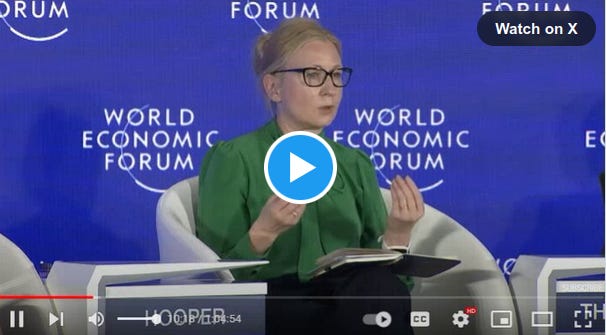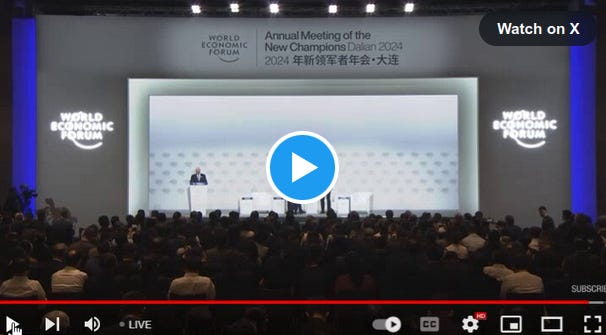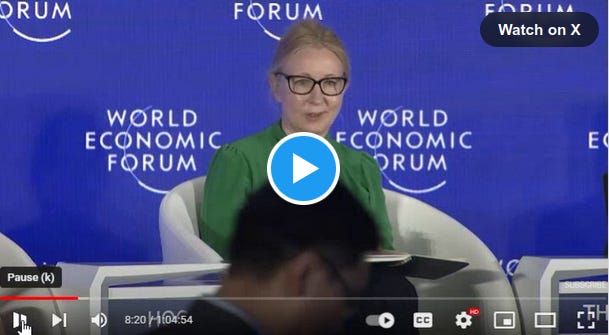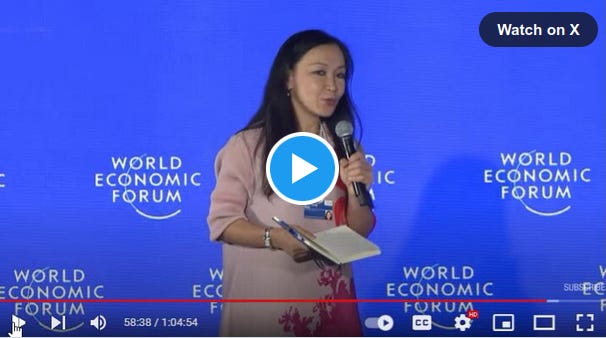While You Were Distracted: WEF Pushes Plans to Seize Control of Food, Water, and Oxygen Supply
World Economic Forum (WEF) members have begun discussing plans to seize control of all elements of nature that humans rely on for survival such as food, water, and even the oxygen supply.
One-time or recurring donations can be made through Ko-Fi:
By Frank Bergman June 28, 20
World Economic Forum (WEF) members have begun discussing plans to seize control of all elements of nature that humans rely on for survival such as food, water, and even the oxygen supply.
During the WEF Annual Meeting of the New Champions, also known as “Summer Davos,” in Dalian, China, globalists declared that natural systems are finite and must be corporatized.
During a Summer Davos panel discussion, WEF speaker Lindsay Hooper blasted members of the general public for expecting water and oxygen to be “unlimited” and “free.”
Hooper, the University of Cambridge Institute for Sustainability Leadership CEO, argued that food, water, and oxygen are “forms of natural capital” that global elites must put “on the balance sheet.”
“We can’t do business on a dead planet,” she warned fellow WEF members gathered for the annual event.
Hooper pushed the plan during the panel titled “Understanding Nature’s Ledger.”
During the panel, globalists argued that every part of the economy depends on nature.
They concluded that in order to “protect” natural systems, unelected corporate elites must “bring nature onto the balance sheet.”
“If we’re going to protect natural systems, one of the solutions is to bring nature onto the balance sheet; bring nature into the ways that decisions are made within business to allocate a value to it — to bring it into accounting and financial mechanisms,” Hooper explained.
WATCH:
Hooper warned WEF members that efforts to further expand wealth and power are “not sustainable on a finite planet.”
According to Hooper, “The ways in which we have grown our economies, our models of economic development, have been incredibly successful for global prosperity.
“The unintended consequences of current models of growth are simply not sustainable on a finite planet.”
Hooper’s words echo those of WEF founder Klaus Schwab.
At the Summer Davos opening plenary on Tuesday, Schwab said that there were “limits to growth.”
Schwab told global elites that ushering in the globalist agenda will require humanity to be forced into a “collaboration” with the unelected organization, as Slay News reported.
He argues that “economic growth,” and a more “peaceful” future will come from reducing population numbers and embracing innovation such as artificial intelligence (AI) while using the green agenda to advance policy change.
At the end of his address, Schwab returned to the topic of the fourth industrial revolution while revisiting this year’s theme, saying that there were “limits to growth.”
WATCH:
As Slay News reported, “Limits to Growth” is a nod to the Club of Rome book of the same name published in 1972.
The book is a manifesto for reducing the global population of humans.
The book’s author, Dennis Meadows, is a WEF member and is considered an architect of the organization’s anti-human agenda.
As Slay News has previously reported, Meadows advocated for global elites to orchestrate a mass depopulation event to wipe out 86% of the human race.
He argues that the “elites” left behind would have a better life with fewer humans on Earth.
After making a subtle nod to this agenda, Schwab says that these limits can be overcome by using technologies of the fourth industrial revolution wisely.
He asserted that the green agenda must be promoted as a “great opportunity for humankind.”
During the WEF panel on “Understanding Nature’s Ledger,” Hooper warned that nature should never be treated within the economy as though it were free and unlimited.
“At the moment, the way that decisions are made on an everyday level within businesses and financial institutions is because we’re looking at financial data metrics that are not factoring-in nature,” Hooper said.
“Nature is treated within the economy as though it’s unlimited, and predominantly as though it’s free,” she lamented.
WATCH:
According to Hooper, it’s because “every part of the economy is fundamentally dependent on nature.”
As a result, globalists must seize control of “the air that we breathe, the water we drink, the soil, the oceans that we need for the food that we need to consume, the minerals that we need as inputs to technology and into infrastructure,” Hooper declared.
“Without these forms of value, these forms of natural capital, we won’t have economies.
“They are the fundamental building blocks of our economies.”
In addition to putting “nature on the balance sheet,” another proposal coming at the end of the panel discussion suggested putting a tax on natural systems like water in the same vein as carbon taxes.
In her presentation, WEF managing director for nature and climate Gim Huay Neo said that “integrating natural capital to our accounting framework” should happen soon.
“We need to keep pushing while continuing to refine and enhance, and the best example I can give is carbon pricing,” Neo told WEF members.
“Today, carbon pricing, ETS [Emissions Trading Systems], carbon taxes really cover about 25 percent of global emissions.
“We should actually look at scaling this to cover all 100 percent of carbon emissions.
“And beyond carbon let’s think about other aspects of nature that are easier to quantify.
“We will probably not be able to quantify everything on day one, but what about water?
“That’s quite possible for us to start integrating systematically into current trading carbon pricing mechanisms.”
WATCH:
FULL VIDEO:
Global elites have been increasingly pushing similar plans in recent years, however.
At COP27 in November 2022, former Bank of England advisor and G20 co-chairman Michael Sheren said that carbon was “moving very quickly into a system where it’s going to be close to a currency.”
He asserted that next on the agenda was the tokenization of nature and biodiversity, where places like Indonesia, Brazil, and Africa would be “absolutely critical.”
“Carbon, we already figured out, and carbon is moving very quickly into a system where it’s going to be very close to a currency, basically being able to take a ton of absorbed or sequestered carbon and being able to create a forward-pricing curve, with financial service architecture, documentation,” said Sheren.
And with carbon being close to a currency, “There are going to be derivatives.”
He then declared that next on the agenda is the tokenization of water, trees, oxygen, and just about everything else in nature.
“We start thinking about putting prices on water, on trees, on biodiversity, we find where does that sit?” Sheren pondered.
“How do we start tokenizing?
“How do we start building systems that actually create not only the value but transfer that value around the world?”
WATCH:
During this year’s WEF Annual Meeting in Davos, Switzerland in January, a similar panelwas held called, “Putting a Price on Nature.”
Amid the discussion, Amazonian community leader Uyunkar Domingo Peas Nampichkai said that it was impossible to put a price on a sacred, living ecosystem.
“When we speak about Mother Earth and our ecosystem, when larger companies speak about its value, for us this ecosystem is a sacred ecosystem; there’s no value to it; it’s invaluable,” he said.
Nevertheless, during the annual Davos event in 2022, one WEF member pitched plans to trigger a global water crisis as a means to usher in control over the masses.
As Slay News reported, WEF spokesperson Professor Mariana Mazzucato argues that a crisis centered around “water” will “deliver” where “Covid” and “climate change” both “failed.”
“You need water,” Mazzucato asserted during a panel discussion before an audience of salivating globalists.
Source: slaynews.com
Related articles:








No comments:
Post a Comment